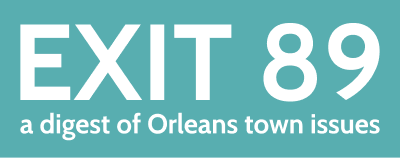Happy Spring, EXIT 89 Readers!
It’s that time of year again: Town Meeting is a week away. Whether you’re a Town Meeting stalwart, a sometimes-attender, or a T.M. newbie — there’s never been a more important time to let your voice be heard.
There are so many exciting possibilities on the table for Orleans. What would you like to see become reality? A Town Campus? A re-imagined Rock Harbor? A multi-use path to Nauset Beach? A new library?
Whether your answer is “all of the above” or “none of the above” or something in between, mark your calendars:
Orleans Annual and Special Town Meeting
Monday, May 13 — 6 PM
Nauset Middle School Gymnasium
You may want to arrive early to check in, grab a handheld electronic voting gizmo, and find a seat. Bring some water, maybe a snack, and your copy of the Warrant. Especially great news: Free childcare and pizza for kids ages 4-13 will be provided by the Orleans Recreation Department (pre-registration is required by Thursday, May 9). Printed copies of the Warrant are waiting for you at Town Hall, or click here to see one online. All votes must be cast in person. Channel 8 will record the entire meeting as well as live-stream it here.
Speaking of the Warrant . . . it looks different this year. Svelte and bound in bright white cardstock (and less costly than in past years), it’s been revamped, reorganized and streamlined. Open the cover and find a quick take on the FY 25 Budget. You’ll want to spend time reading the thoughtful letters from Town Manager Kim Newman and the Orleans Finance Committee.
Next you’ll see the list of articles — 50 on the Annual Town Meeting Warrant, and another four on the Special Town Meeting Warrant (pages 53 and 54). Many articles offer helpful graphics, cost breakdowns, and simpler-to-understand “Explanations” (formerly “Summaries”). In the back (and indexed in the front), you’ll find all the usual supporting materials, including the full FY 25 budget, Orleans Town Meeting bylaws, information on enterprise funds and FY 25 fees, project descriptions for the capital improvements plan, a revenue summary for FY 25, an explanation of the town’s long-term debt, a glossary of municipal finance terms, and the ballot for the Town Election on May 21st.
Keep reading for EXIT 89’s preview of articles that caught our eye...
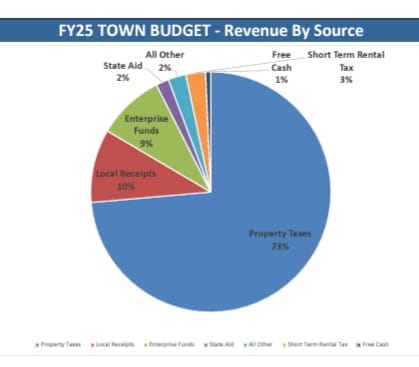
Article 13: Town/School Budget
If you look closely, you’ll see that the Town of Orleans Operating Budget for FY 25 looks a bit different, too — and not only the bottom line, $51.2 million. Town Manager Kim Newman, with help from staff and members of the Finance Committee, has streamlined it with the goal of increased transparency, more financial flexibility, and a more efficient Town Meeting.
What’s different?
For starters, some items that used to be free-standing articles — voted on individually each year, usually passed unanimously and funded by “Raise and Appropriate" or Free Cash — are now inside the Operating Budget, including funding for a variety of community service organizations, town boards and committees, and a number of community events.
There are also new categories. The broad category of “Health and Human Services” includes the Health Department, the Council on Aging, and Veterans Benefits — all still with their own individual budgets. Another sub-category under Health and Human Services is “Human and Community Service Contracts,” which includes the Early Education and Care Program (previously voted on individually, referred to as the Pre-K Program, and incorporated into the Town Manager’s budget last year). Another broad category, “Culture and Recreation,” now includes Snow Library, the Historic Commission, the Recreation Department, and Special Events and Information.
So what about that bottom-line number? It’s up nearly 12 percent from FY 24, in part because of the expenses that are now inside the budget instead of outside. We’re also spending more. In her Overview letter, Town Manager Newman talks about investing in both the “human” and “physical” infrastructures of Orleans. FY 25’s budget reflects a number of new positions and also sets aside money — $410,000, up from $50,000 last year — for professional reclassifications and negotiations, and $500,000 — up from $80,000 in FY 24 — for the Finance Committee Reserve Fund. The latter is intended to allow the town to respond more effectively when unforeseen financial needs arise throughout the year.
A third driver of the bigger budget is debt. The town debt service is up nearly 13 percent from last year to just over $8 million and our share of the Nauset Regional School District High School Building Project is up 87 percent — to $1.78 million — due to the timing of bonding for project costs.
Want to go even more granular? You can find the complete, clearer-than-ever budget, starting on page 65 of the Warrant. Get comfy — it’s 30 pages long! A digital version, with graphs and other exciting stuff, can be found here. And for Kim Newman’s budget presentation to the Orleans Citizens Forum, click here. The Select Board voted unanimously in support of the budget. The Finance Committee was divided 7-2. A simple majority vote at Town Meeting is required for it to pass.
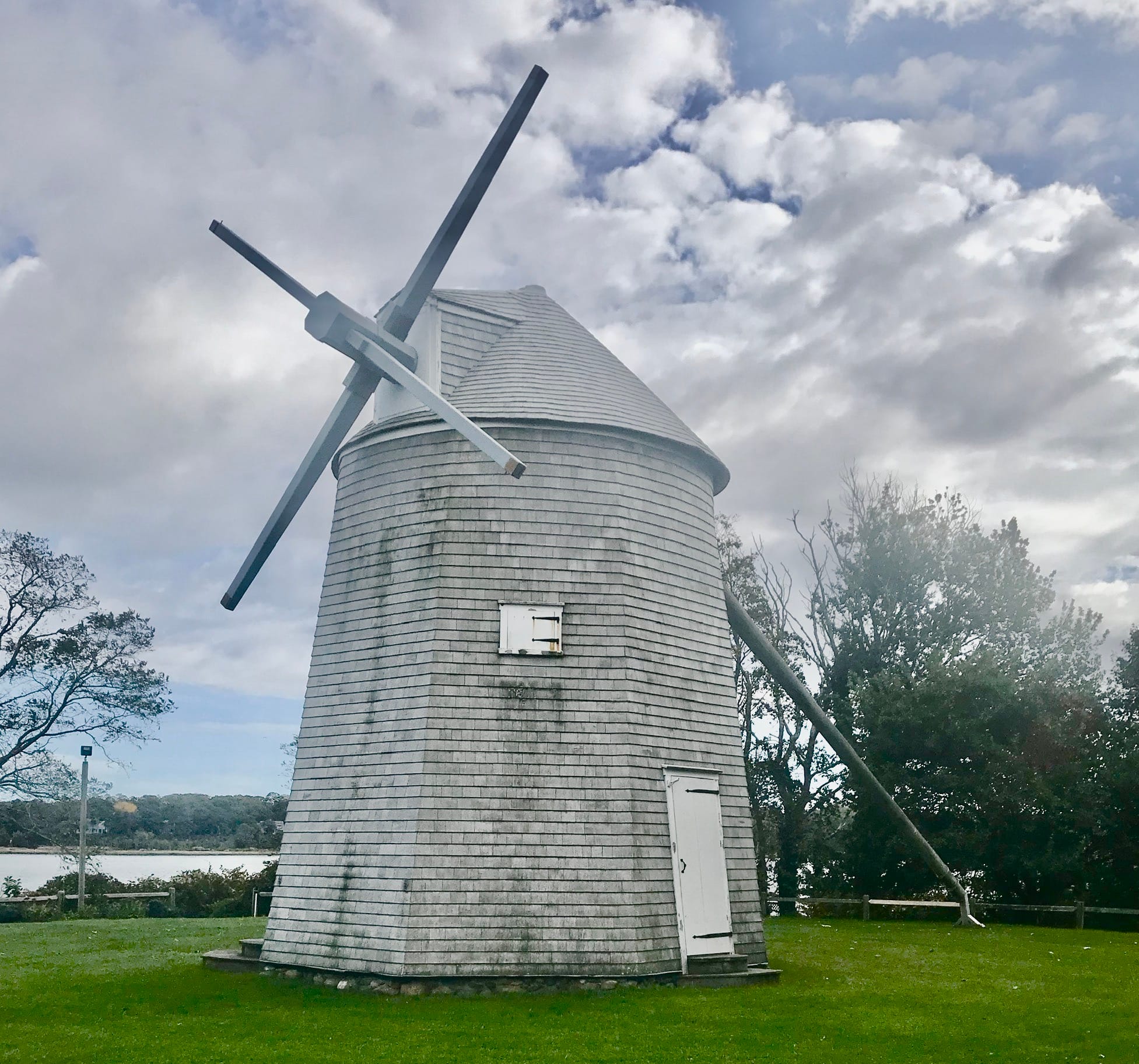
Articles 14, 20-23: Capital Improvements Plan + Stabilization Funds
Last summer, our Long Range Capital Planning Committee, with the help of town staff, began working on an updated Capital Improvements Plan (CIP), looking at the costs of acquisitions, equipment, infrastructure improvements, and other projects over the next five years, from FY 26 to FY 30. The result is Article 14, which you can find on pages 25-26 of the Warrant.
All together, the list of potential expenditures across the next five years — from the Wastewater Master Plan to funding for a new Snow Library and completion of a Town Campus — provides an interesting glimpse into what the future of Orleans could look like. In the back of the Warrant, pages 108-120, each of these projects is described in detail.
What’s different from last year’s CIP? There’s more in it, including all the vehicles and equipment being funded from the “Vehicle & Equipment Stabilization Fund” (see below) as well as projects being funded from the “Buildings & Facilities Stabilization Fund” (also below). You’ll find more information too, most notably, in the list of potential expenditures, a new column (on the left) identifies the town department — “owner” or “sponsor” — for each project or piece of equipment or vehicle. Another column (third from left) identifies the funding source. The current balances in various funding sources are also provided, along with amounts requested. The Orleans Select Board voted unanimously in support of the CIP. The Finance Committee's vote was 8-1. A simple majority vote is required for it to pass.
Another way to prepare for what’s on the horizon: Stabilization Funds. According to the glossary of municipal finance terms at the back of the Warrant, these funds are “designed to accumulate amounts for capital and other future spending purposes.” In a series of four proposals, Articles 20-23, voters are asked to approve Stabilization Funds for Water Quality Drainage Improvements ($206,759), Town Pavement Management ($413,543), Buildings & Facilities Maintenance ($400,000), and Vehicles & Equipment ($1,279,813).
Why is the last number so large? In recent years, the standard “ask” was $450,000 for Town Vehicles & Equipment. It has increased dramatically for FY 25 to almost $1.3 million due to years of deferred requests for upgrades and replacements. Going forward, the Town Manager’s stated plan is to step back and look more strategically at future needs. The Select Board and the Finance Committee voted unanimously to support all four articles. A simple majority vote is required at Town Meeting for each of them to pass. (This used to be a two-thirds majority vote but the rules have changed.)
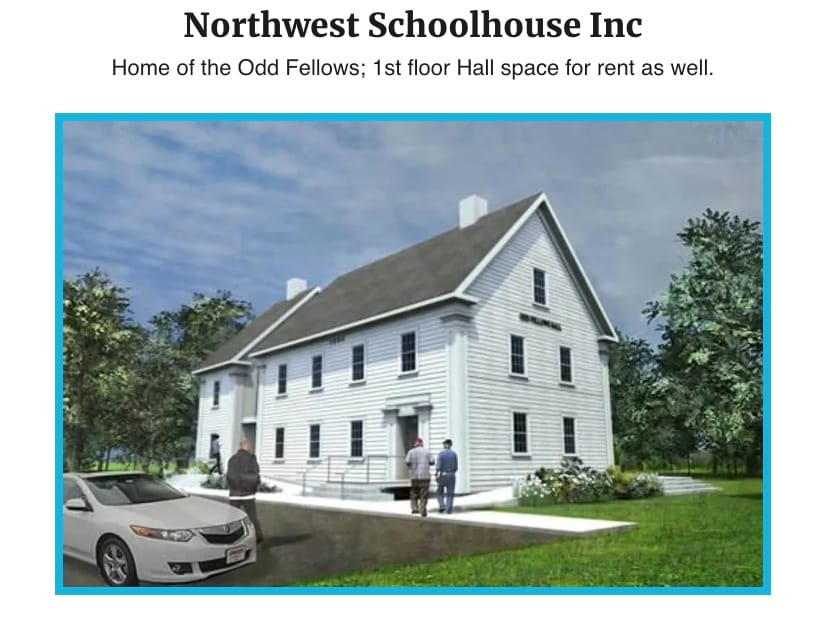
Article 15: Community Preservation Act Program Budget
Community Preservation Committees (CPCs) have been established in 196 cities and towns across the Commonwealth with a general objective of “preserving and improving a community’s character and quality of life.” The appropriations for the Orleans CPC are funded by state contributions and a 3% surcharge on our property tax bills. Each year, our CPC reviews grant applications from local organizations and town departments seeking to support and enhance our open space, recreation, affordable housing and historic preservation, and offers its recommendations for Orleans voters to approve.
This year’s list of 14 projects includes general funding for the Affordable Housing Trust Fund Board ($400,000), funding for an Affordable Housing Trust-sponsored rental assistance program ($95,000), and support for an affordable housing development on Millstone Road in Brewster ($120,000). Also included in this year’s CPC budget are improvements to Veteran’s Park ($150,000), a contribution toward the exterior restoration of the Academy of Performing Arts ($25,000), a renovation of the walkways and garden at the Orleans Council on Aging ($26,000), a continuing restoration at Oddfellow’s Northwest Schoolhouse ($52,320) and other community-focused programs. The CPC’s total budget for FY 24 is just under $1.4 million. The Orleans Select Board and Finance Committee both voted unanimously in support. Funding is already accounted for on our property tax bills, supplemented by available funds as well as an anticipated grant of nearly $250,000 from the Commonwealth. A simple majority vote at Town Meeting is required for the funding to be approved.
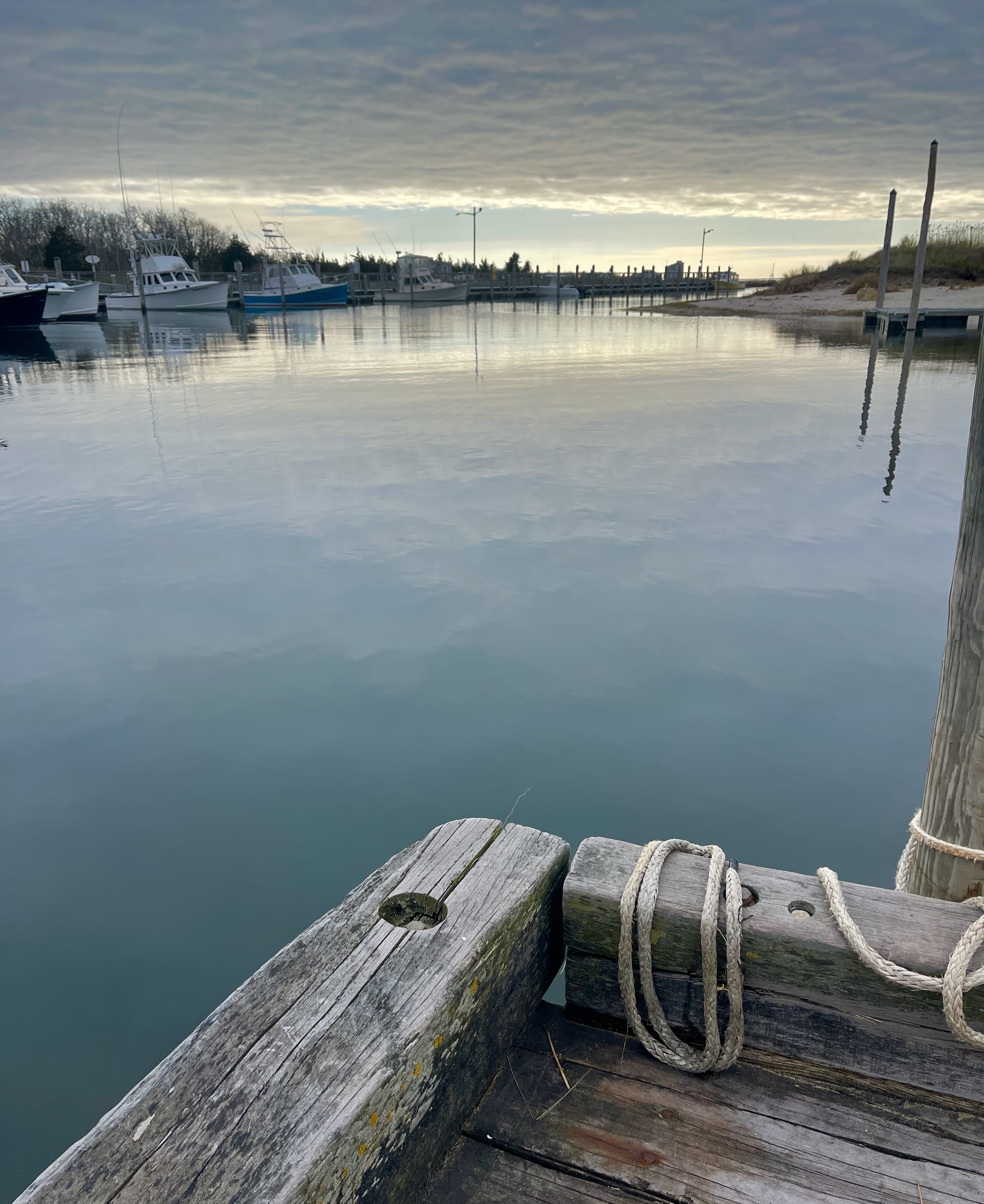
Article 17: Rock Harbor Wharf
Rock Harbor has an illustrious history as the site of the Battle of Orleans in 1814, when local militia defended the man-made harbor from a British attack. Over the last two centuries, it has become a cherished feature of life in Orleans, the home port for charter fishing, commercial fishing and serious sunset-watching too.
The charter-boat slips are in good shape, but seven years ago an inspection of the aging commercial wharf found extensive problems. Two years later, in 2019, Orleans was awarded a grant to fund the design and permitting to make improvements. The commercial fishing community using the waterfront was integral to the decision process and a final design was adopted that improves access and safety for the fleet with a floating dock system along the bulkhead, end-in docking slips for commercial vessels, and a hoist system for unloading catch. Along with a public viewing area, there are upgrades to fueling operations, lighting, and access to the water. To watch a Town Hall video about the project, click here. For two excellent pieces about this project in the Cape Cod Chronicle, click here and here.
Estimated earlier this year to cost between $6 million and $7 million, bids for the final design came back higher. Article 17 asks for $9 million to fund the construction phase, planned to run from October 2024 to April 2025. There is a reasonable chance that two different grants could cover as much as $3 million of these costs, but the article is not contingent on this. Both the Select Board and Finance Committee voted unanimously in support. A two-thirds majority vote at Town Meeting is required for it to pass, followed by approval of a Prop 2 ½ override on the ballot.
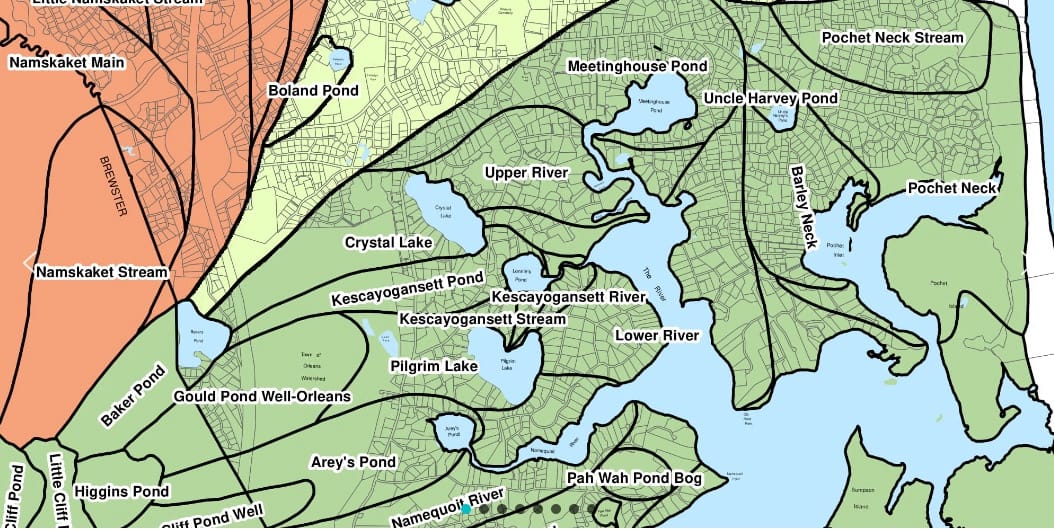
Articles 18, 19, 28 + 29: Water, Water, Water
Water quality management is essential to the future of Orleans. How we protect our ponds, lakes, and estuaries from nutrient overload (which runs off our lawns and leaches from our septic systems) is why our epic Wastewater Project is so important.
With the Downtown Phase of the plan completed, we are now in the midst of Phase II, specifically the construction of the Meetinghouse Pond Area sewers — what all the digging and detours are about — and looking ahead to finalize proposed plans for Phase III. Article 18 asks for $1.2 million for funding the final design for the “Lakes & Ponds Sewer Study Area,” which refers to a water-wealthy area of Orleans that includes Crystal Lake, Pilgrim Lake, Lonnie’s Pond and Arey’s Pond. The Select Board voted 4-0-1 on this initiative, with one member of the board abstaining. The Finance Committee was in unanimous support. A two-thirds majority vote at Town Meeting is required for it to pass, followed by approval of a Prop 2 ½ override on the ballot.
Next up, Article 19 proposes to expand Phase II, currently underway, to include 28 additional properties on Black Duck Lane, Walker Road, Cedar Cove Road, Lestage Road, and Captain Dean Road (for a map, see page 102 of the Warrant). No additional funds are required for this expansion. Both the Select Board and the Finance Committee voted unanimously in support. A two-thirds majority vote at Town Meeting is required for it to pass.
Water testing is the subject of Article 28, which asks for $261,074 to support town-wide marine and freshwater sampling, post-alum treatment monitoring of freshwater ponds, oystering efforts at Lonnie’s Pond, as well as required compliance reporting. This article also provides consulting funds for wastewater management coordination. Both the Select Board and Finance Committee voted unanimously in support. A simple majority vote at Town Meeting is required for it to pass.
That brings us to Crystal Lake — and the toxic cyanobacteria bloom that closed it to all activity in the fall of 2023. Article 29 proposes an alum treatment to help prevent future blooms. The Association to Preserve Cape Cod, Orleans Pond Coalition and the Orleans Marine and Freshwater Quality Committee support the treatment, which would cost $75,000. (You can read our coverage of last fall’s debate over treating Pilgrim Lake with alum here. A Cape Cod Chronicle piece on the treatment is here.) Contractors are standing by, waiting for voters to greenlight the treatment, which needs to be completed before the water gets too warm. The Select Board voted in support of the article; the Finance Committee was unanimous in its support. A simple majority vote at Town Meeting is required for it to pass.
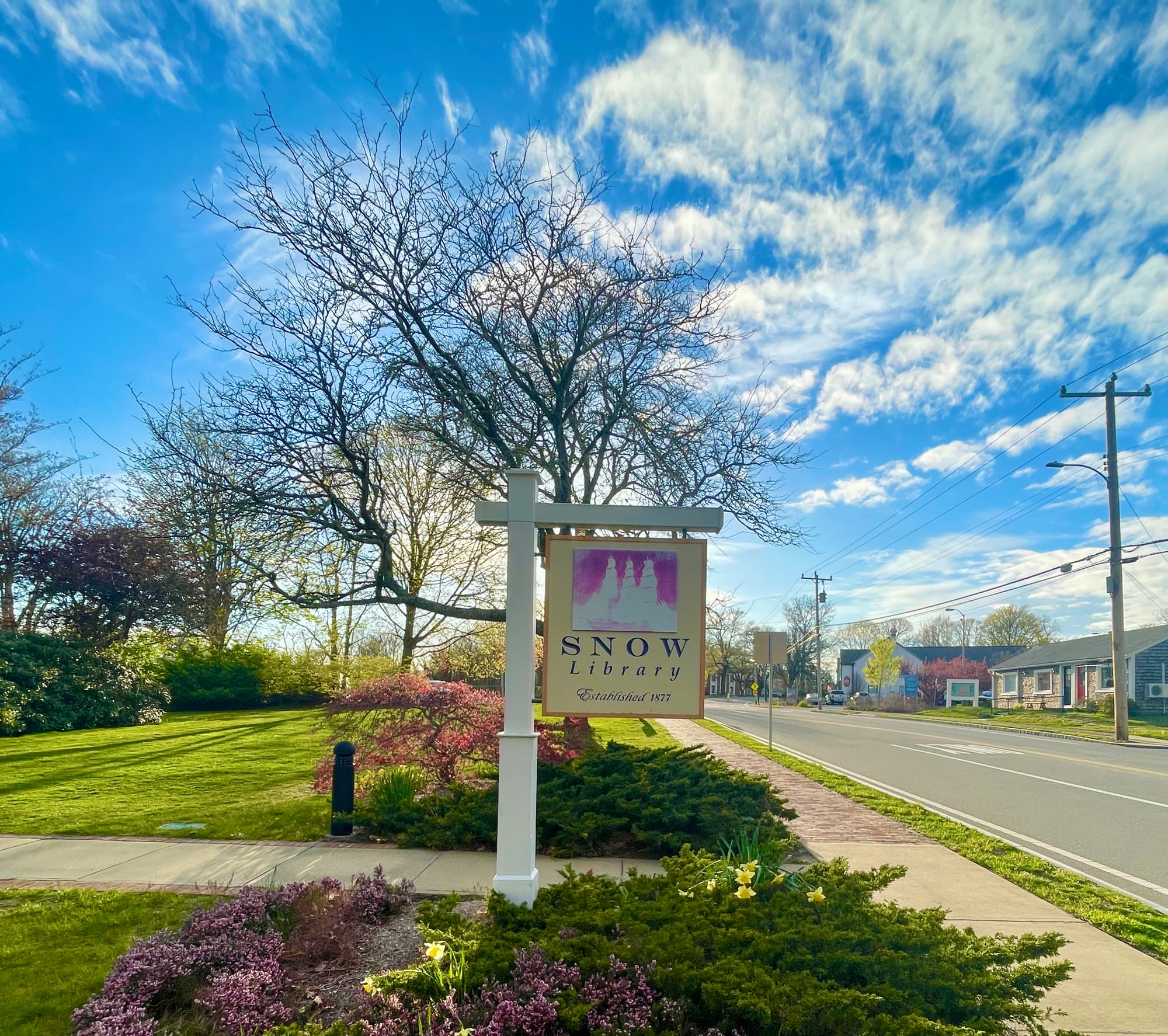
Article 31: Snow Library Grant
The roof leaks. Parking is tough. There’s no shelf space left. Snow Library, one of the community hubs of Orleans, is in need of extensive repairs or replacement. At the end of this month, after nearly a decade of board meetings, brainstorming, strategic planning, a $180,000 feasibility study and two public forums, the Snow Library Board of Trustees and Snow Library Feasibility Task Force will be submitting an application for a grant from the Massachusetts Public Library Construction Program (MPLCP) to help Orleans replace the aging Main Street facility.
Article 31 asks for $150,000 in funds, required by the grant application process, to demonstrate residents’ support for a new library. How big a difference would the grant make? Building a library of the proposed size — 24,000 square feet — is projected to cost $25 million. MPLCP usually provides between 30-40 percent of the design and construction costs, or as much as $10 million. To watch a video explaining Article 31, click here. To read more about the plans and proposals for a new library, have a look at EXIT 89’s recent Progress Report Issue with links to design concepts and more, here. Both the Select Board and Finance Committee voted unanimously in support. A simple majority vote at Town Meeting is required for it to pass.
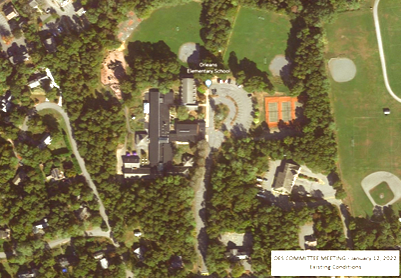
Article 32: Town Campus Study
Most Orleans residents know we are in dire need of a new fire station, and maybe a new elementary school too. An idea now being put forward is the creation of a “campus” on the 23 acres occupied by the elementary school and the fire station at 46 and 58 Eldredge Park Way.
This article asks for an appropriation of $150,000 for a Town Campus Study that will, according to the Warrant, ”provide for a collaborative process between the Select Board and the Orleans Elementary School Committee towards identifying solutions for future fire/rescue station, elementary school, and recreational/community facility.” It would also incorporate information from the previously completed studies on the fire station, elementary school (available in the August 2, 2023 Select Board Meeting packet, pages 19-43), athletic fields, community center, and recreation.
One major selling point for the campus idea is economic. By embarking on a single design process, financing process, and phased building process — instead of several separate ones — we could potentially save money. Want to dive deeper into the town campus concept? EXIT 89’s recent Progress Report has you covered. Both the Select Board and the Finance Committee voted unanimously in support. A simple majority vote at Town Meeting is required for it to pass.
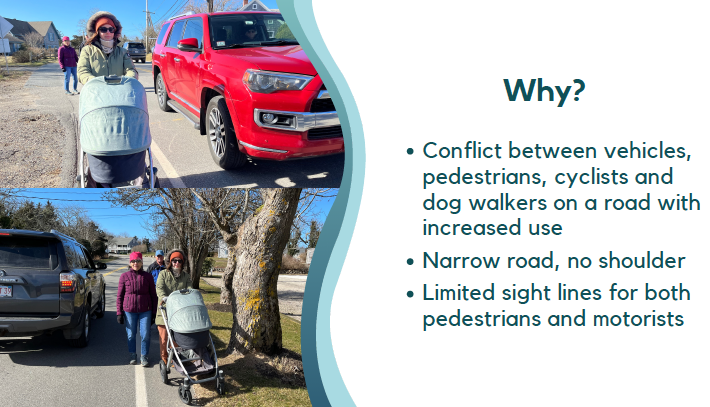
Article 33: Multi-use Pathway to Nauset
In 2021, Orleans adopted a “Complete Streets Policy” with the potential of funding from the Commonwealth of Massachusetts to support it, pledging to improve “the travel experience for all users of its streets — motorists, pedestrians, and bicyclists.” The ultimate goal is a network of safe routes that people can use to navigate town. Article 33 asks for an appropriation of $85,000 to fund a feasibility study for a shared, multi-use pathway that would run along Beach Road to Nauset Beach, designed to accommodate foot and bike traffic, baby strollers, skateboards, etc. The study would produce up to four different design options that would consider all the logistics of right-of-way requirements and utility pole relocation, as well as the existence of driveways, culverts, stone walls, trees, and other infrastructure. At a recent Orleans Citizens Forum, Orleans Transportation and Bikeways Advisory Committee Chair Alice Thomason Van Oot said they’ve learned from public input that residents do not want sidewalks and granite curbstones.
For a Cape Cod Chronicle story about the initiative, click here. To see a recording of the public meeting recently hosted by the Orleans Transportation and Bikeways Advisory Committee, click here. Both the Select Board and Finance Committee voted unanimously to support the article. A simple majority vote at Town Meeting is required for it to pass.
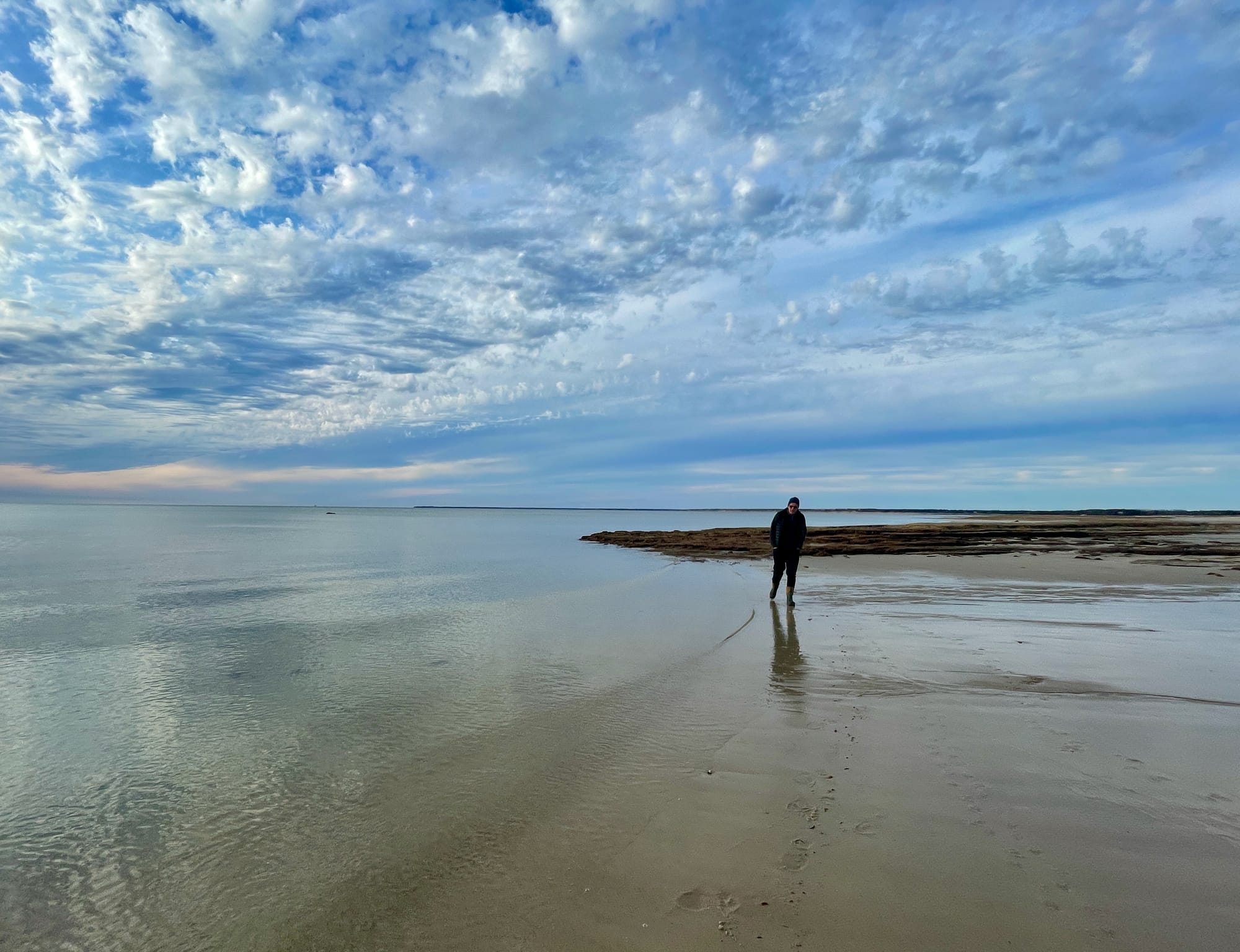
Article 34: Skaket Beach Management Plan
Skaket Beach has long been treasured by residents and visitors alike for its super-swimmable waters, walk-for-miles tidal flats, and spectacular sunsets. Its future, given climate change, with its rising sea levels and coastal erosion due to more frequent and powerful storms, is uncertain. To make sure Skaket Beach is as resilient — and as accessible — as possible, for as long as possible, we need a plan.
According to Nate Sears, Orleans Director of Natural Resources, it’s becoming ever-clearer that the current practice of adding sand to Skaket each year is not as effective as it used to be, and likely not sustainable. Article 34 asks voters to approve $80,000 to fund a plan to manage and maintain access to Skaket — comparable to the plan now being implemented for Nauset Beach.
“As Orleans adapts to climate change,” says Sears, “coastal resiliency projects in Town are critical — and so is community awareness of the effects of rising sea levels on our shoreline.” The Select Board unanimously to support funding a plan. The Finance Committee voted 7-2 in favor. A simple majority vote at Town Meeting is required for the article to pass.
Article 37: Establishing Guidelines for Orleans Early Education and Care Program
Like many communities in Massachusetts and around the country, Orleans is in the midst of an affordability crisis. One major driver for families is sky-high childcare costs.
In October 2021, Orleans residents voted to offer Orleans families support for pre-school education, up to $5,000 a year for every three-year-old, and up to $10,000 a year for every four-year-old. (Families fill out an application and the money goes directly to the licensed childcare provider. You can find information on the program here.) The total available was $495,000 per year, but so far residents have not used more than $260,000 each year. Nobody’s quite clear on why — insufficient publicity? Fewer kids than were planned for? Or do families need other kinds of support more?
This article would allow the Select Board to re-shape the Orleans Early Education and Care Program (formerly referred to as the “pre-K program”) to better meet families’ needs. This could mean adding support for care for younger children, summer and school-holiday care, or before- or after-school care, among other things. Any decisions would be voted on in a public Select Board Meeting. For more information on how Massachusetts municipalities are working to support families, click here. Both the Select Board and the Finance Committee were unanimous in their support. A simple majority vote at Town Meeting is required for the article to pass.
Article 42: A Resolution Supporting the Massachusetts Affordable Homes Act
This article asks Orleans voters to go on record supporting two provisions in a pending piece of State legislation — the Affordable Homes Act. The first provision would allow Orleans to adopt its own real estate transfer fee, a percentage of a property’s value that the seller (of properties over a certain value) would have to pay. The exact percentage of the fee (up to 2%) — and the property value at which it kicks in — would be determined locally. There could also be a percentage applied to the whole sale price, with additional fees kicking in as the value goes up. Revenue from the fees would fund affordable and attainable housing without additional pressure on taxpayers.
The second provision gives communities the option of adopting a “Seasonal Community” designation and becoming part of a state-wide housing program geared specifically toward communities with this designation. Article 42 is non-binding and involves no money.
You can read more about the proposed legislation in the Boston Globe here. This 2022 opinion piece from the Cape Cod Times by Community Development Partnership’s Jay Coburn and former Nantucket Housing Director Tucker Holland makes a case for transfer fees. The Select Board voted in unanimous support of the article. The Finance Committee was split 6-3. A simple majority vote at Town Meeting is required for this article to pass.

Articles 43-48: Zoning Bylaw Changes
In Greek mythology, a Hecatoncheire was a giant monster with fifty heads and one hundred arms — a beast comparable to our housing/affordability crisis, which also must be attacked from many different angles at once, and with a variety of weapons. There are shovels in the ground on West Road, where housing is going up. Orleans is looking at real-estate transfer fee legislation. It’s exploring programs to financially support local working families. And there are more arrows in our quiver.
The six proposed changes to our zoning bylaws (fun fact: the town's zoning bylaws were introduced in 1949 to manage burgeoning growth; see the Cape Cod Chronicle’s recent reporting to learn more) are directed at encouraging the development of “attainable” housing — i.e., housing that falls in the gap between “affordable” and, well, astronomical. (You can read a recent report on Orleans’ updated housing needs here.) As Assistant Town Planner Mike Solitro explained at the recent Orleans Citizens’ Forum, Orleans needs more small, lower-priced homes and these changes are intended to make it easier for people to build them.
Changes include: simplifying the permitting process for small apartment projects and removing some restrictions on dwellings in the business districts; specifying a 30-day minimum lease for new apartments in the business districts (to ensure they don’t become short-term rentals); simplifying parking regulations; removing minimum lot-size requirements, and expanding maximum allowable square footage for new Accessory Dwelling Units (ADU’s). Both the Select Board and the Finance Committee voted unanimously to support all six articles. A two-thirds majority vote at Town Meeting is required for them to pass.
Article 49: Wetlands Bylaws
A Citizen’s Petition initiated this article, which seeks greater public engagement in changes to regulations that impact wetlands protection by requiring approval by a Town Meeting vote. Currently, regulatory changes adopted by the Conservation Commission require only a public hearing, which means, according to the petitioner, not enough residents will hear about them — a problem, the petitioner maintains, when 45 percent of all properties in town are impacted by Wetland Protection Regulations. The Select Board voted unanimously against supporting this proposal. The Finance Committee was split 4-5 against. A simple majority vote at Town Meeting is required for it to pass.
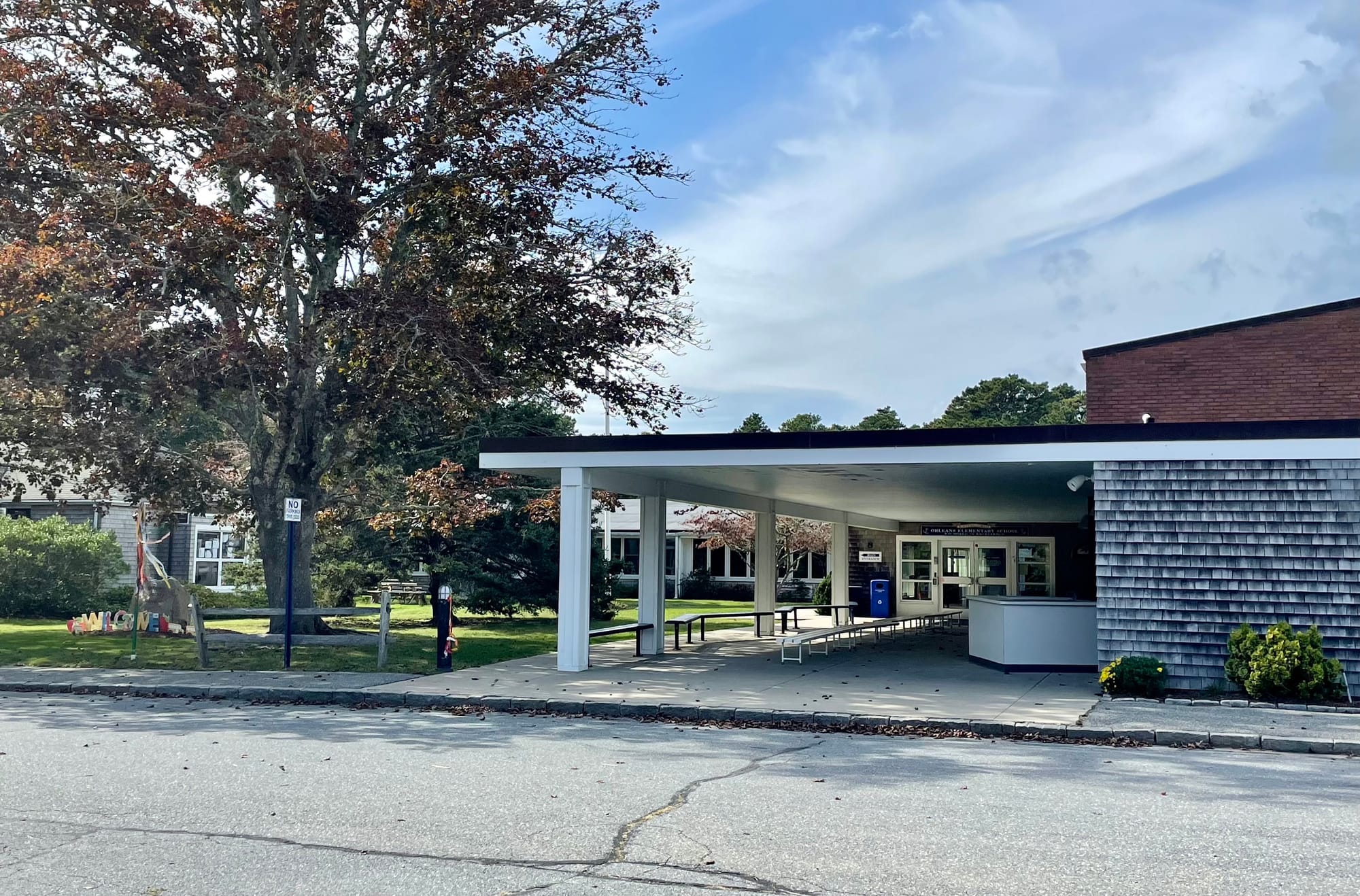
Article 2 of Special Town Meeting Warrant: Fund Elementary School Study
Back in January, the four towns in the Nauset Regional School District (Brewster, Eastham, Orleans and Wellfleet) submitted a joint application for State funding to gather and analyze District-wide data on trends in elementary school demographics, enrollment, staffing, transportation, student-teacher ratios, operating expenses, school building conditions and other factors. That grant for a “regionalization and efficiency” study was not awarded due to lack of available funds, so the towns have decided to secure funding themselves — $200,000 total. To see the grant proposal for the study, click here. Article 2 asks voters to approve the funding source for Orleans’ share — $50,000.
Go Deeper
- For Town Hall videos explaining Warrant articles, click here
- For a 90-minute Orleans Citizens Forum discussion of the Town Meeting Warrant, moderated by EXIT 89, click here
- For the Cape Cod Chronicle overview of Orleans Annual Town Meeting, click here
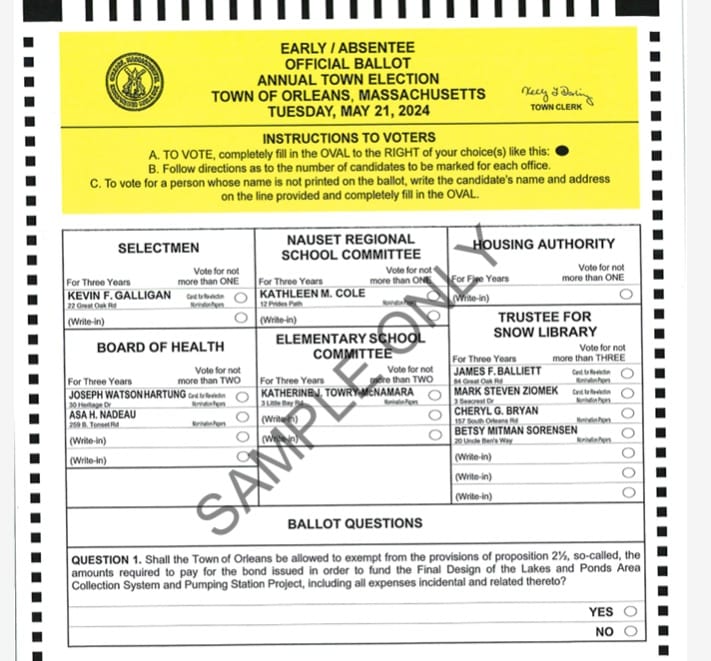
Reminder to Vote Again
Our Annual Election – paper ballots, voting booths! – is Tuesday, May 21, 9:00 AM - 7:00 PM at the Council on Aging Senior Center. Along with as many as 6 questions concerning overrides and Charter Amendment proposals, we’ll be voting to fill:
- 1 Select Board seat
- 2 Health Board seats
- 2 Orleans Elementary School Committee seats
- 3 Snow Library Trustee positions
- 1 Housing Authority seat
- 1 Nauset Regional School Committee position
For a sample ballot, click here
We’ll see you at Town Meeting!

EXIT 89 is an independent publication. Our mission is to help Orleans voters make sense of town issues by providing a clear and impartial overview of the latest developments. We want to help fill the current information gap, reduce the "mystery" of Town Meeting, and promote vibrant civic engagement.
Our hyperlocal digest is researched and written by journalists Martha Sherrill and Emily Miller. Elaine Baird and Lynn Bruneau are the founding advisors. Editing, infographics, and tech support are provided by Kazmira Nedeau of Sea Howl Bookshop. We are all residents of Orleans.
Our digest is 100% free — and we aim to keep it that way. If you find what we do valuable, please consider supporting us. With Lower Cape Television (LCTV) — a 503(c)(3) — as our fiscal sponsor, all contributions are now tax deductible. Donations by a check made out to "EXIT 89" will save us a processing fee. Please send these to EXIT 89, P.O. Box 1145, Orleans, MA 02653. To donate online, click here.
As always, we’d love to hear from you. Readers have enriched our understanding of Orleans — and sharpened our focus. Please share questions, comments, and ideas for future issues at hello@exit89.org. And if you are new to EXIT 89, take a moment to sign up for a free subscription.
